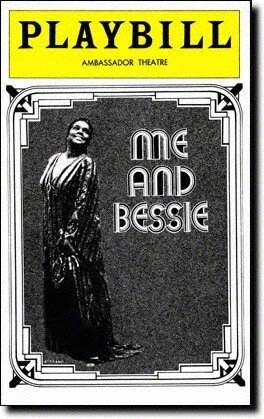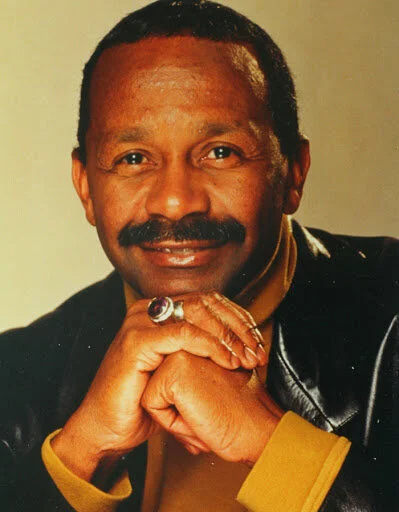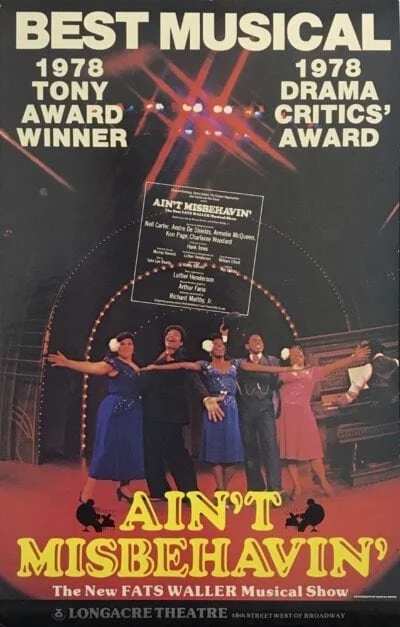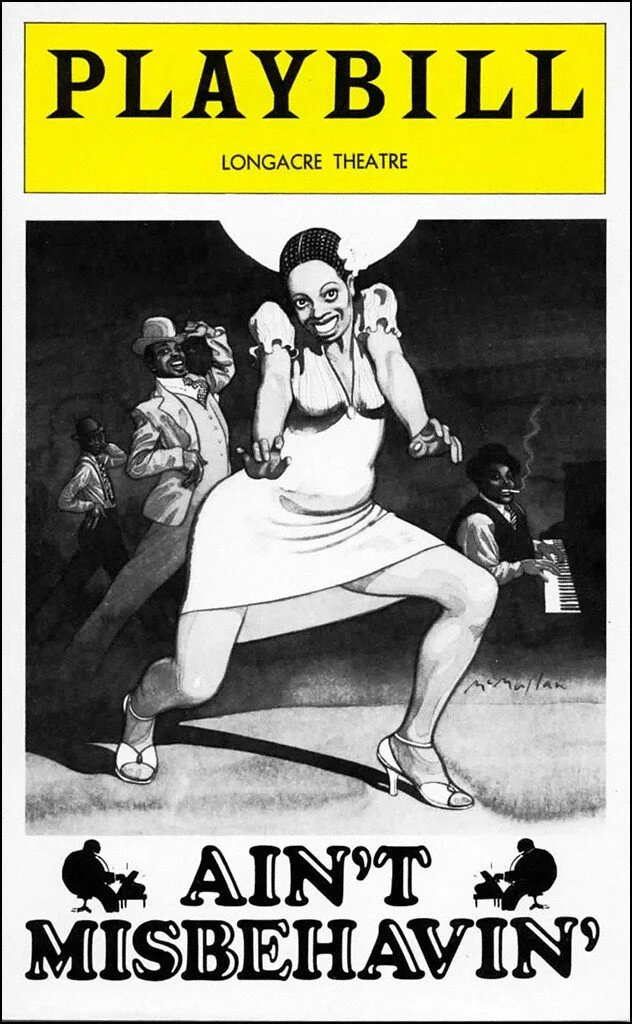Black Revues of the 1970s
“The decade also saw multiple blacks revues, including Bubbling Brown Sugar (1976), Ain’t Misbehavin’ (1978), and Eubie! (1978), which all celebrated the contributions of twentieth-century black composers and performers from Fats Waller to Eubie Blake.”
The Great White Way - Warren Hoffman
Me & Bessie - Opening: October 22, 1975 - Ambassador Theatre
“Me and Bessie is a musical revue about the life and career of blues singer Bessie Smith. The basically one-woman show, conceived and written by Will Holt and Linda Hopkins and performed by Hopkins, features songs by Lil Green, Clarence Williams, Henry Creamer, Andy Razaf, and Jimmy Cox, among others.
The Broadway production was directed by Greenwald, with special dance sequences choreographed by Lester Wilson for two characters, identified only as Man and Woman (Lester Wilson and Gerri Dean). Howlett Smith and Lenny Hambro were co-Musical Directors. Donald Harris was responsible for scenic design.
Following two previews, it opened at the Ambassador Theatre on October 22, 1975. It transferred to the Edison Theatre on December 3, 1975 and remained there until December 5, 1976, running for a total of 453 performances. Between September 24 and its closing, it ran in repertory with Oh! Calcutta!”
“Linda Hopkins, who is 51 years old, started singing at the age of 3 in a New Orleans church the same church where she was born on the back steps at her father's funeral. It took 20 years from her successful audition for a job in an Oakland, Calif., nightclub for her to reach Broadway.
Miss Hopkins made her Broadway debut in “Purlie” as the church soloist in the opening act. In 1972, she won a Tony award for best supporting actress in the short‐lived musical “Inner City.”
Watch: Linda Hopkins sing two songs from “Me & Bessie”
Watch: Linda Hopkins sing “It’s Nobody Business”
“Hopkins walked to center stage and admitted to the audience: “I ain’t Bessie. But, you know there’s a lot of Bessie in me.” Then in a combination of ancedotes, reminiscences, and songs, Hopkins brought the legend of Bessie Smith back to life.
The show enjoyed almost a year-long run at Broadway’s Ambassador and Edison theatres.”
Black Musical Theatre - Allen Woll, pg. 266
Bubbling Brown Sugar - Opening: March 2, 1976 - Anta Playhouse
Bubbling Brown Sugar is a musical revue written by Loften Mitchell based on a concept by Rosetta LeNoire and featuring the music of numerous African-American artists who were popular during the Harlem Renaissance, 1920–1940, including Duke Ellington, Eubie Blake, Count Basie, Cab Calloway and Fats Waller. Original music, including the title theme song "Bubbling Brown Sugar" was composed by pianist Emme Kemp, a protégé of the legendary Eubie Blake. It was nominated for the Tony Award for Best Musical and the Laurence Olivier Award for Best New Musical. Robert M. Cooper directed and produced the Broadway and tour productions.
The show was set in a Harlem nightclub of the 1920s-1940s. It opened on Broadway at the ANTA Playhouse on March 2, 1976, and closed on December 31, 1977, after 766 performances.
“Mitchell [the book writer] was criticized, however, for moving toward escapism and away from the social relevance of the black musicals of the early 1970s. Mitchell disputed this notion, finding a new relevance in his resurrection of black entertainment history:
“I would hope that this play would cause a rethinking in terms of the black community. I would hope that it would have some kind of contagious effect, a chain reaction that would make folks say ‘look a here, we ain’t all that poor. We may be broke, but we’re not poor.”
Black Musical Theatre - Allen Woll, pg. 266-267
Watch: Bubbling Brown Sugar at the 1976 Tony Awards
Watch: Bubbling Brown Sugar’s Excerpt 1
“On Broadway, Mr. Billy Wilson choreographed and staged shows that included "Eubie," for which he shared credit with Henry Le Tang, "Merlin," a production of "Stop the World, I Want to Get Off," with Sammy Davis Jr., and Alan J. Lerner's last Broadway show, "Dance a Little Closer," along with the 1976 hit "Bubbling Brown Sugar."
He was nominated for three Tony Awards, and he directed and choreographed the all-black production of "Guys and Dolls" in 1976 and choreographed the Emmy Award-winning television show "Zoom."
Deep Dive: Listen to Vivian Reed, star of Bubbling Brown Sugar, tell the story of the rehearsal process





“For Mitchell, also a noted historian of black theatre, an exploration of the black past could be a source of identity and pride for the black community.” - Allen Woll
Ain’t Misbehavin’ - Opening: May 9, 1978 - Longacre Theatre
“The most successful musical revue to bring back Harlem’s golden age was 1978’s Ain’t Misbehavin’. Based on a concept by Murray Horwitz and Richard Maltby, Jr. and directed by Malty, with musical arrangements by Luther Henderson and choreography by Arthur Faria, the show celebrated the life and music of Thomas “Fats” Waller. A stride pianist, composer, singer, and comic entertainer, Waller waas known mainly for his compositions and comic persona during his lifetime, but later recognized for the important role he plaayed in laying the groundwork for modern jazz piano.”
Black Broadway - Stewart F. Lane, pg. 200
“Ain’t Misbehavin’ began as an intimate show with a limited run at the Manhattan Theatre Club, but critical acclaim and packed houses prompted the team of producers to transplant the revue to the Longacre Theatre in May 1978.”
Black Broadway - Stewart F. Lane, pg. 201
Deep Dive: Watch the full production of Ain’t Misbehavin’
Watch: “Honeysuckle Rose” from Ain’t Misbehavin’ at the 1981 Tony Awards
In 1978, Ain’t Misbehavin’ won the Tony Award for Best Musical, and the Drama Desk Award for Outstanding Musical
“Ain’t Misbehavin’ returned the black musical to center stage in May 1978, with another survey of the history of black musical theatre.
After the show won three Tony Awards, it created a new interest in the music and personality of Waller, who had died in 1943 at age 39.”
Black Musical Theatre - Allen Woll, pg. 269-270
Watch: 54 Below celebrate Ain’t Misbehavin’
Eubie! - Opening: September 20, 1978- Ambassador Theatre
“The year 1978 also brought the musical Eubie! to Broadway. A homage to ragtime composer and pianist Eubie Blake, Eubie! was conceived and directed by Julianne Boyd and choreographed by Billy Wilson and Henry LeTang [both black choreographers]. It offered 24 songs, including “Charleston Rag,” “Shuffle Along,” and “Goodnight Angeline.”
Eubie! ran from September 1978 to October 1979 at the Ambassador Theatre, with the cast giving 439 performances. The spirited revue was nominated for several awards and won three: Maurice Hines and Gregory Hines received Outer Critics Circle Awards, and Gregory Hines won a Theatre World Award.”
Black Broadway - Stewart F. Lane, pg. 201
“The key to the success of Eubie! was the sense of the historical period in the song numbers, as a nostalgic glow suffused the entire evening.”
Black Musical Theatre - Allen Woll, pg. 270
Deep Dive: Watch the full production of Eubie!
Watch: “Hot Feet” from Eubie! at the 1979 Tony Awards
Interview with Director, Julianne Boyd:
“I was involved in cabaret when I discovered the music of Eubie Blake. I worked up the concept for Eubie and took it to Theatre on the Park. They needed a play for Black HIstory Month, so I took the music from his 1921 hit, Shuffle Along, and expanded it. And before you knew it, we had a show.”
“Gregory and Maurice Hines have two of the hottest pairs of dancing feet this theater season. Appearing in “Eubie,” they have been singled out for rousing ovations by enthusiastic audiences as they tap, sing and clown their way through their first big Broadway show. For them, the applause is only part of the joy.”
“Eubie! also played a major role in clarifying Eubie Blake’s contribution to the history of black musical theatre.
Eubie! finally returned the hero of the 1920s to the Broadway stage, and introduced new audiences to the songs and piano work of a master.”
Black Musical Theatre - Allen Woll, pg. 270



















